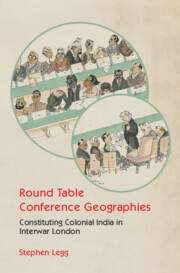Book contents
- Frontmatter
- Contents
- List of Figures and Tables
- Acknowledgements
- Note on Conversions, Spellings and Abbreviations
- 1 Introduction: Squaring Round Tables
- Part I Geographical Imaginations
- Part II Conference Infrastructures
- Part III The Conference City
- Part IV Representations
- Notes
- References
- Index
- Miscellaneous Endmatter
10 - Petitions and Protests: The Page and the Street
Published online by Cambridge University Press: 15 January 2023
- Frontmatter
- Contents
- List of Figures and Tables
- Acknowledgements
- Note on Conversions, Spellings and Abbreviations
- 1 Introduction: Squaring Round Tables
- Part I Geographical Imaginations
- Part II Conference Infrastructures
- Part III The Conference City
- Part IV Representations
- Notes
- References
- Index
- Miscellaneous Endmatter
Summary
THE QUESTION OF REPRESENTATION
The Round Table Conference (RTC) was tasked with squaring the circle of interwar Indian politics. Around an oval table the delegates negotiated the incompatible geometries of colonial sovereignty and liberal freedoms. At the centre of the table was the question of representation. For all its clanking authoritarianism, the Government of India did not desire full autocracy; it sought sovereignty, not domination alone. Modern governmentality, rather than simply sovereign power, required the assent of those whom the government represented. For Dipesh Chakrabarty (2007), drawing on Thomas Hobbes, by the interwar years the British in India accepted that they could not aspire to ‘instituted’ (or constituted) sovereignty, willingly given by the people to their chosen representatives (also see Mantena 2016). At best they hoped to solidify their ‘acquired’ (or constituent) sovereignty, through which the people accepted that they would be represented by their conquerors.
The question of representation was not an abstractly philosophical one at the conference. Rather, it was a constant refrain in the protests, both written and enacted, that accompanied the conference throughout. For the conference’s most famous delegate it was at the heart of the RTC’s unreality. In an interview on 31 October 1931, Gandhi was asked by the Indian Conciliation Group, ‘Upon what grounds do you consider the Round Table Conference to be unrepresentative?’ He responded, ‘It is unrepresentative in every sense of the word. No one has come by right of election – even those who have been elected have come by invitation. I have come by invitation.’ He continued that while not even the king could turn the prime minister out of the House of Commons, Gandhi could be barred from the conference at any point. The conference delegates should, he insisted, have been elected by the Indian people as their representatives at a free conference.
Gandhi, however, quickly found himself mired in the intractable question of Indian representation. First, he asserted that Congress was representative of the masses and if the depressed classes had been given a referendum, he would have been chosen as their representative: ‘They do not want separate representation.’ Secondly, he claimed that the princes had come to London in a false double capacity, claiming to represent themselves and their subjects.
- Type
- Chapter
- Information
- Round Table Conference GeographiesConstituting Colonial India in Interwar London, pp. 291 - 313Publisher: Cambridge University PressPrint publication year: 2023



